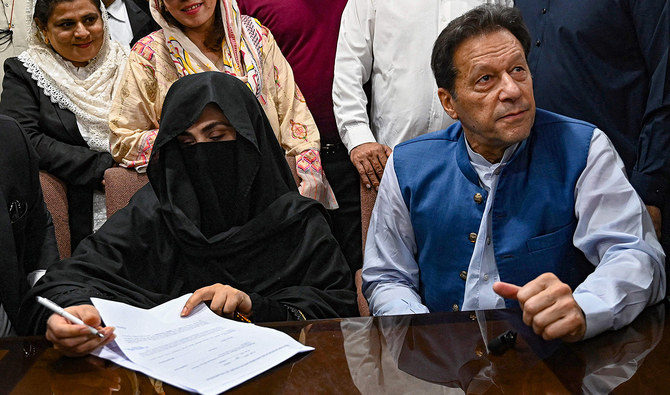ISLAMABAD: Former Pakistani Prime Minister Imran Khan and his wife were sentenced to 14 years in jail on Wednesday, his party said, in a case that relates to accusations the ex-premier undervalued gifts from a state repository and gained profits from selling them while he held the country’s top office.
Sentencing in the case, which was filed by the National Accountability Bureau (NAB), comes a day after Khan was handed a 10-year jail term in another case for his role in publicizing a classified diplomatic cable and leaking state secrets. In August, Khan was sentenced to three-years in prison by the election commission for failing to declare assets gained from selling gifts received in his tenure as PM from 2018-2022 and worth more than 140 million rupees ($501,000).
Khan says all cases against him are politically motivated and meant to end his political career amid a groundswell of popularity for his Pakistan Tehreek-e-Insaf (PTI) party since he was ousted from the PM’s office in April 2022 in a parliamentary no-trust vote. Khan alleges his removal was orchestrated by the country’s all-powerful military and his political rivals with the backing of Washington. All three deny the charge.
The new sentences for Khan come just a week before national elections are scheduled to be held on Feb. 8, which Khan’s PTI party is contesting amid what it calls a military-led crackdown. The army denies this.
Wednesday’s ruling also includes a 10-year disqualification for Khan from holding public office, the PTI said. Independent observers and voters are widely raising questions about the legitimacy of the upcoming polls if the country’s most popular politician and arguably its biggest political party are sidelined.
Senior PTI leader Syed Zulfikar Bokhari said the party would “immediately” appeal Wednesday’s verdict by the National Accountability Bureau court.
“First a half broken democracy was dismantled and now the judicial system has been shattered,” he said.
In a statement sent to the media, the PTI called the judgment flawed and a “decision reached in a haste only a few days before elections.”
“We believe it’s an attempt to provoke supporters to stage protests paving way to sabotage the electoral process,” the PTI said.
“However, please note, all PTI leadership has repeatedly asked support base to stay focused on the electoral campaign while the legal team fights it out in the higher courts.”
In its Dec. 23 reference against Khan and his wife Bushra Bibi, who surrendered to police after Wednesday’s sentencing, NAB had accused them of undervaluing state gifts during assessments and selling them for profits of Rs1573.72 million ($5.6 million). NAB said the duo had received 108 gifts, out of which they “retained 58 x • gift boxes/sets against an undervalued amount of Rs.142,123,100 as assessed by appraisers.”
“That it established from the record and statements of witnesses/ approver that the accused No. 1 Imran Ahmad Khan Niazi & accused No.2 Bushra Imran, by way of dishonest, corrupt and illegal means, misused the power; vested in the office of the Prime Minister and got involved in financial shenanigan thus obtained monetary gain amounting to Rs. 1573.72 million and caused huge loss to the national exchequer for their personal gain,” the NAB case file reads.
The gifts include perfumes, diamond jewelry, dinner sets and seven watches, six of them Rolexes — the most expensive being a “Master Graff limited edition” valued at Rs85 million ($304,000).
“DOZENS OF CASES”
Wednesday’s ruling in the state gifts case is Khan’s third conviction in as many cases while he has been in jail since August last year. He also faces dozens of other cases on charges ranging from terrorism and blasphemy to attempted murder and treason.
Khan was also previously arrested for four days in May last year in another case that he and Bushra Bibi received land as a bribe through the Al-Qadir Trust, a charitable trust they set up in 2018 when Khan was still in office. Pakistani authorities have accused Khan and his wife of receiving the land, worth up to 7 billion rupees ($25 million), from a property developer charged in Britain with money laundering. The bribe, authorities say, was in exchange for a favor to the property developer by using 190 million pounds repatriated by Britain in the money laundering probe to pay fines levied by a court against the developer.
Khan’s aides say the land was donated to the trust for charitable purposes. The real estate developer has also denied any wrongdoing.
Khan and most senior leaders of his party have been rejected as candidates for the Feb. 8 vote in what they say is a state-backed campaign to thwart their participation.
Khan, 71, was ousted in April 2022 after falling out with Pakistan’s powerful military leaders who are widely believed to have backed him into power in 2018.
In opposition, he waged an unprecedented campaign of defiance against the military establishment which has directly ruled the nation for almost half of its history but says it no longer interferes in politics.
“OFFICES SEALED”
In a separate development, the PTI said it had called a General Body Meeting in Islamabad and multiple cities of the four provinces as part of election planning but police had encircled the offices in the Pakistani capital of Islamabad, as well as Quetta, the provincial capital of Balochistan.
“Our party members are being denied access to the premises by the police,” PTI General Secretary Omar Ayub Khan said on X, calling on the senior judiciary to take action.
“Every obstacle is being placed in PTI’s path to prevent us from functioning as a political party, but we shall endure and persevere ... The people of Pakistan are with PM Imran Khan and PTI. This fact alone terrifies our opponents.”
“Tehreek-e-Insaaf is being prevented from meeting even inside its office. Is it a level playing field?” the PTI said in another X post as it posted visuals of police outside its Islamabad secretariat.0
















